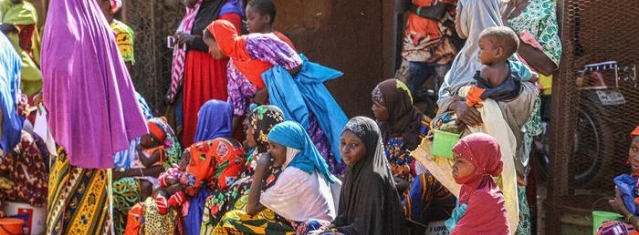News
NUTRITION CRISIS LOOMS OVER NIGER’S CHILDREN AMID BORDER CLOSURES
AND POLITICAL TURMOIL

(Source: WFP via ReliefWeb)
ARAC International StratCom -
Unprecedented Political Turmoil and Border Closures Exacerbate the Nutritional Crisis, Leaving Vulnerable Children in Peril and Humanitarian Aid Stranded.
In the wake of extensive border closures due to ongoing political unrest in Niger, over 90,000 children under five, residing in the crisis-riddled regions, are experiencing a detrimental scarcity of specialized nutritional foods, which are essential to thwarting the progression of their condition from moderate to severe malnutrition. The United Nations World Food Programme (WFP) and other humanitarian entities struggle to import necessary nutritional products into Niger, elevating concerns over a prospective large-scale nutritional crisis.
The situation is pressing, and unless expedited solutions are instituted, the number of affected children could potentially escalate to 160,000 by October 2023. “To sidestep a severe nutritional crisis, supplies must reach the country, failing which, we might witness an outbreak of serious infections and a surge in preventable deaths,” articulates Jean-Noel Gentile, the Country Director and Representative of WFP in Niger.
In the wake of extensive border closures due to ongoing political unrest in Niger, over 90,000 children under five, residing in the crisis-riddled regions, are experiencing a detrimental scarcity of specialized nutritional foods, which are essential to thwarting the progression of their condition from moderate to severe malnutrition. The United Nations World Food Programme (WFP) and other humanitarian entities struggle to import necessary nutritional products into Niger, elevating concerns over a prospective large-scale nutritional crisis.
The situation is pressing, and unless expedited solutions are instituted, the number of affected children could potentially escalate to 160,000 by October 2023. “To sidestep a severe nutritional crisis, supplies must reach the country, failing which, we might witness an outbreak of serious infections and a surge in preventable deaths,” articulates Jean-Noel Gentile, the Country Director and Representative of WFP in Niger.
In-Depth Analysis: Context and Impact
The prevailing political instability in Niger, coupled with subsequent border closures, has resulted in the blockade of over 9,300 mt of essential WFP cargo, including specialized foods for malnutrition treatment and prevention, bound for Niger and Burkina Faso. The obstructed supply lines have forced WFP to halt supplementary feeding for approximately 90,000 moderately malnourished children since early September in Tahoua, Maradi, and Zinder.This interruption is feared to aggravate the already grim nutritional landscape in a nation where vulnerable households continuously grapple with accessing nutritious food due to seasonal deficits, inflation in food prices, and diminished purchasing power, particularly during lean and pre-harvest seasons. Moreover, recent analyses by WFP and its partners report a substantial 21% hike in the average prices of staples like rice and sorghum in the aftermath of the political turmoil, further straining the resources of susceptible families.
To read the full article log on to the link at the bottom. Subscribe to the free newsletter and learn more about ARAC International's commitment to sustainable development, peace, human rights, and global security.
more information: https://newsletter.arac-international.org
Liability for this article lies with the author, who also holds the copyright. Editorial content from USPA may be quoted on other websites as long as the quote comprises no more than 5% of the entire text, is marked as such and the source is named (via hyperlink).






